In this post I continue my work on sixteen co-productions between The Open University and the BBC which were made for television transmission as part of the course materials supporting the work of distance-learning undergraduate students who were enrolled on the A307 Drama course which ran annually from 1977 to 1981. The first in my series of posts on A307 discussed the course’s aims and modus operandi before looking at a production of the second half of Sophocles’ Oedipus Tyrannus. My second post considered a condensed production of Shakespeare’s Macbeth and my third a production of Pirandello’s Six Characters in Search of an Author.
Today I focus on one of these sixteen co-productions which never, in fact, made it as far as small-screen transmission: the production was a shortened version of Jean Genet’s play Le Balcon, in Bernard Frechtmann’s translation and with a strong cast including Vivien Merchant (1929-1982) in the role of Madame Irma, under the direction of Nick Levinson (whom I would like to thank warmly for his help with this piece of research).
Le Balcon was written in 1956 and first performed in an English version at the Arts Theatre in London in the following year although, owing to its subject matter, a subsequent performance which was to be directed by Peter Brook in Paris was threatened with closure if it went ahead, a threat which prefigures the storm it was to precipitate at the BBC twenty years later.
The play — a mediation on illusion and reality, role-playing, authority and power — acts out the sexual fantasies of clients in a brothel whilst insurrection rages in the city outside. The fantasies include a gas-man (Richard Henry) pretending to be a bishop absolving a penitent (Pauline Peart) in a cathedral, a judge (John Bryans) passing sentence on a young female thief (Anna Bergman) and then observing her being whipped (by Danny Schiller) in punishment and a general (Richard Beale) riding into battle on a woman-horse (Lucinda Gane) who later draws a gun-carriage bearing his ‘dead’ body. These clients are called on to play out their fantasy roles for real when revolution threatens to come to pass in the city outside; they appear, for example, on the balcony of the brothel so that the public can be persuaded that these figures of authority are still intact. Genet’s play is not a simple political allegory: neither the established order nor the revolutionaries are condemned equally.
The idea for the A307 production of this play had, as usual, been submitted to the BBC’s Controller of Educational Broadcasting, Don Gratton, who had raised no objections. However, in November 1976, the Controller of BBC2 Aubrey Singer (1927-2007) viewed the programme alongside a couple of others and it (very gradually) became known at the OU that he had problems, of differing severity, with all three productions and an argument between the OU and the BBC ensued which resulted in a complete ban on the A307 production of The Balcony being shown on television.
Singer wanted the productions of Jarry’s Ubu Roi, Büchner’s Woyzeck and Genet’s The Balcony to be removed from the Sunday schedule (although, interestingly, the mother-son incest of Oedipus Tyrannus didn’t cause him any concern on that front); furthermore, he wanted Woyzeck to be edited and the opening of The Balcony to be substantially remade. Ubu Roi went out on a Saturday evening (with The Observer, firmly on the side of the OU in this dispute, playfully urging ‘you and your kids to see it’: 1 May 1977, 29). The offending scenes in Woyzeck (which included an ‘overlong’ stabbing scene which had made too effective audio use of a cabbage and ‘over-intense’ breathing by a woman in a love scene where both partners are fully clothed) were never edited out, but the production was switched to an early Saturday morning slot, rather than the regular Sunday one (John Izbicki, ‘BBC Ban Sex in £20,000 Play for TV University’, The Daily Telegraph, 14 May 1977).
The Open University, however, refused to re-make The Balcony, considering that ‘It’s quite impossible either professionally or educationally to remake three scenes a year later, nor indeed is a remake justified’ (The Observer, 15 May 1977, 32). As a result, it seems, this production was never transmitted by the BBC. The Course Team were, of course, at liberty to show it to a sub-set of students who attended the one-week summer school and, in light of the controversy, hold some very interesting student debates on the issue of censorship. At this point it is worth noting that the seeming divide between the OU and the BBC on this issue was note entirely clear-cut. The producer for The Balcony was Nick Levinson who recalls that, although as a BBC employee he was technically supposed to represent the best interests of the Corporation, his artistic and intellectual sympathies and loyalties lay with the OU and he was as ardently against any re-make as the academics on the Course Team.
The BBC’s position baffled cultural critics in the press. Michael Church in The Times, for example, thought the BBC’s position ‘ludicrous’, especially since the programmes were in his opinion ‘de luxe […] and justly acclaimed by the critics’: ‘Why waste such riches on a few thousand conscientious, bleary heads’, he wondered, ‘when at the push of a different button, and at a civilized hour, you could offer them to as many millions?’ (23 May 1977, 11). The feeling amongst members of the A307 Course Team — both the academics and the producers — was that Singer’s ruling had a lot to do with his desire to remove OU programmes from BBC2 altogether (The Observer, 15 May 1977, 32). This view seems to be lent weight by the fact that the channel had actually shown Joseph Strick’s film of the play in 1972. Indeed, BBC1 had shown the film version as recently as 1975.
Singer’s seeming moral concern was considered to be very much at the expense of intellectual engagement: ‘The Balcony is set in a brothel, but the perversions — ordinary men fantasising the roles of authority — are disturbing in their intellectual metaphorical implications, rather than in any visual detail, a few fleeting glimpses of breast apart’ (The Guardian, 24 May 1977, 15). Academics in other institutions were even more strident in defence of the OU’s position. Ten from the University of Exeter wrote to the Editor of The Guardian in the following terms: ‘The inability of the BBC administration to distinguish gratuitous titillation from the dramatic expression of a powerful and important artistic vision is unfortunate. […] academic integrity should not be subject to prejudices exercised under the guise of “public responsibility” ’ (23 May 1977, 10).
Whatever Singer’s private intentions, the case of The Balcony illustrates the tension that could sometimes appear between the broadcaster’s ostensible responsibility to the public it served and the educators’ insistence on academic and creative freedom. The broadcaster’s mission encompassed education, and the university’s mission encompassed reaching the general public. Yet, the fact that the BBC rejected the Open University’s request for a late-night slot for The Balcony, considering that this established theatre work ‘might offend’ or be ‘unsuitable’ for a non-university audience speaks volumes about the subtle ideological differences in how these two institutions balanced the demands of public broadcasting and public engagement with cultural works (The Times, 14 May 1977, 16; The Guardian, 24 May 1977, 15). Perhaps also, of course, it reflected the growing influence of Mary Whitehouse’s campaign against sex and violence on television.
The OU refused to compromise its position on academic freedom and the BBC effectively practised — it is believed for the first time in its relationship with the OU — an astonishing act of censorship. This was a blip in an otherwise extremely harmonious creative and innovative relationship which pioneered the use of radio and television in distance-learning pedagogy for drama, but it does offer a fascinating insight into contemporary perceptions of television’s roles and responsibilities with regard to higher education and more broadly public engagement in the late 1970s.
My next post will look in detail at one of the other A307 productions which caught Singer’s eye – Büchner’s Woyzeck.
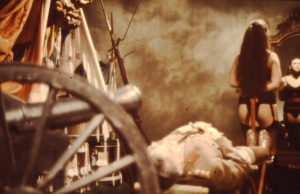
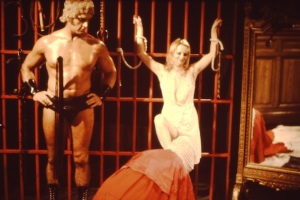
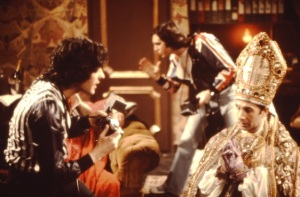
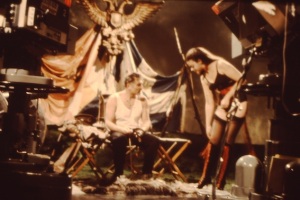
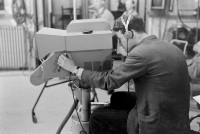
Fascinating read. I landed on this post because a clip appears from this production in the Arena film on Jean Genet, “Saint Genet” (12.11.1985). I was rather hopeful on tracking down a copy. Heigh-ho!
Posted by Ian Greaves | 1 January 2017, 10:20 pmGood morning. I was the set designer on “The Balcony” ,OU Production. I also designed “Woyzeck” , “The Exception and the Rule” and “The Venetian Twins” they were all part of a course, A307 I believe. I have never been able to track down a copy of any of these recordings. Should you come across any of these I would be very grateful to know. Many thanks.
Posted by David Hitchcock | 27 July 2019, 10:39 am